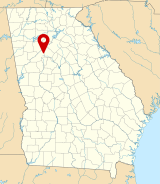Clean Water Atlanta: Energizing Green Infrastructure Through City Programming

Background
The consent decree for Atlanta, Georgia, requires that the city eliminate all unpermitted discharges from their combined sewer system and make improvements to its four wastewater treatment facilities, including the collection and transmission systems, to reduce or eliminate sanitary sewer overflow events. Although Atlanta's consent decree does not require green infrastructure, the city recognizes the benefits of green infrastructure and has voluntarily focused on green infrastructure solutions for stormwater management. As a result, the city relaunched Clean Water Atlanta, an initiative to address consent decrees and improve water quality and security in the region. One goal of the Clean Water Atlanta Program is to align the city's Strategic Green Infrastructure Action Plan with their wet weather strategies.
Quantitative Results
City Ordinance. To facilitate the shift to green infrastructure for stormwater management, the City of Atlanta adopted an ordinance in 2013 that requires all new development and redevelopment to manage the first inch of rainwater that falls on a site using green infrastructure. In the first six years of this ordinance requirement, Atlanta permitted over 4,800 construction projects that use green infrastructure, reducing the volume of polluted runoff entering the city's stormwater and combined sewer systems by 950 million gallons each year.
Strategic Action Plan. In 2018, Atlanta approved its Green Infrastructure Strategic Action Plan, which sets a goal to reduce its stormwater runoff volume by 225 million gallons each year with green infrastructure. The city has also developed a Green Infrastructure Task Force comprised of city departments and external nonprofit partners to help drive the success and implementation of the 2018 Green Infrastructure Strategic Action Plan.
Cook Park. In 2021, Atlanta opened Cook Park on 16 acres of land that was previously prone to severe flooding. The park's design incorporates wet detention ponds with rain gardens and stormwater planters so the community can enjoy other recreational attractions like the playground and splash pad without concern for flooding.
Lessons Learned
City ordinance changes have stimulated adoption of green infrastructure and resulted in considerable combined sewer overflow improvement. Other initiatives, such as the Green Infrastructure Task Force, have focused attention and efforts on green infrastructure implementation while striving toward CSO-related goals.
Sources
- Green Infrastructure in Practice: A Stormwater Management Case Study from Atlanta, GA (pdf)
- Presentation: City of Atlanta Green Infrastructure Initiative Incorporating GI into Watershed Improvement Plans (pdf)
- StoryMap: City of Atlanta Green Infrastructure Program
- Green Infrastructure Strategic Action Plan (2018)
- Stormwater Management Ordinance
- City of Atlanta: Green Infrastructure
- Clean Water Atlanta
